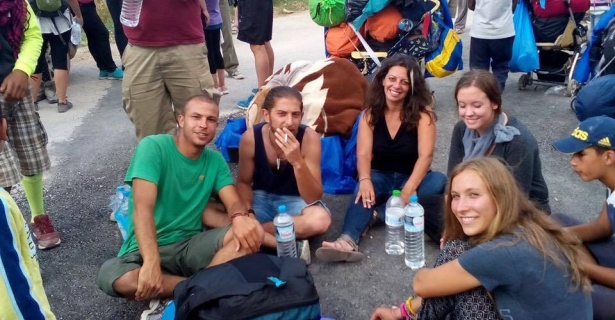Clementine and I strolled over to the Yazidi area of camp with a roll of green plastic mesh and several buckets of paint. After fighting had broken out between the Kurds and Arabs, the Yazidi children had stopped coming to school. Many attempts to bring them back had failed, and so we had decided to restart the outdoor Yazidi English classes I’d been teaching before the new school began. The plastic of the old Yazidi shade structure (where we’d originally held class) had been cut down and stolen, so we were there to provide new plastic, this time painted by the children so as to make it more recognizable and difficult to steal. We laid down the tarp, yelled at the kids to come, handed out the few paintbrushes we had, and set up a speaker playing Shakira. Some of the kids drew flowers, the young ones simply painted uni-colored blobs, and one of the older girls wrote, “I lov skool.”
I stood next to the paint tubs, guarding them from the children. One of the Yazidi men I know walked up, and we exchanged formulaic Arabic “Hello, how are you,” greetings. He gestured at the tarp and asked, “Why are you doing this?” I explained that it’s a project to stop the shade from being stolen and that we need the shade in order to restart the outdoor school.
“It’s nice,” he said, “But all the Yazidis are leaving in an hour.”
“What?”
“We’re leaving camp.”
“Like leaving, leaving?”
He proceeded to inform me that all the Yazidis, all 250 of them, had decided to leave Katsikas camp and move “anywhere else,” due to anti-Yazidi, pro-ISIS graffiti discovered that morning in their bathroom. I assumed I’d misunderstood some of his Arabic and only took him half seriously. Then ten minutes later, after he’d excused himself to go prepare, one of the MSF translators I know walked by. “They’re all leaving,” he said. “In an hour.”
At that point, I told Clementine to watch the kids while I ran to try to find my field coordinator. The Yazidi men were all crammed in a tent in a very serious meeting—one of our translators as well as MSF went and spoke with them; UNHCR arrived about half an hour later. Clementine and I sat outside with the children, playing clapping games and throwing sunflower seeds at targets as their parents shoved their belongings into rucksacks. Every time anyone came out of the meeting, they shook their head. “They’re still leaving.”
About five hours later, the Yazidis began to move their belongings from camp to the main road; yet another time they’ve had to leave everything, take only what they could carry, and simply begin to walk. We helped them haul strollers over drainage canals and stuff backpacks with pillows and blankets. Some of the Kurdish and Arab refugees came over to help and lend their support as well. At the road outside of the camp, the Yazidis stopped and sat down. “No place for us in Iraq, no place for us in Turkey, no place for us in Greece,” one of them told me. None of them knew where they were going; some gestured to the mountains, others mentioned the border, some talked about the public park in town.
Last minute discussions with UNHCR, however, finally yielded a solution, and they agreed to be moved to a previously used, now-empty camp. For hours, we sat with them in the sun, surrounded by all of their belongings, the mood somber. The buses came in waves, the first around 7pm, the last around midnight, ferrying people and bags until no more Yazidis were left in Katsikas. Back in camp, the green shade lay forgotten. When I returned for it the next morning, wending through the empty tents and abandoned cooking areas, it had been stolen.


Add new comment